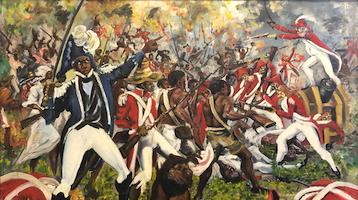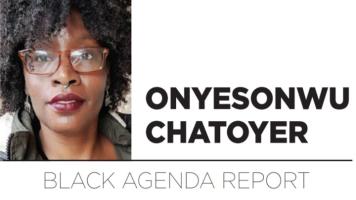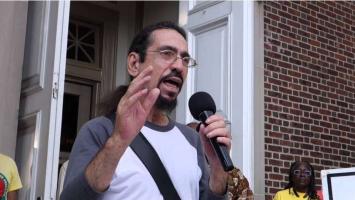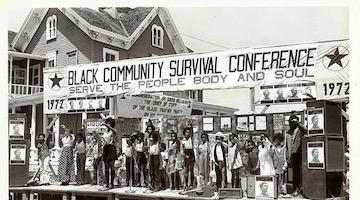Combined with Revolutionary Love, we grow power through mutual aid, political education, release of the incarcerated, and community control over police.
“Revolutionary Love is not romantic or charming.”
Given the long history of U.S. volatility and racist violence, those attentive to white supremacist and fascistic ideologies were dismayed but not surprised at the January 6 breach of the Capitol. A militarized mob endeavored to block the certification of the Biden/Harris election and harm, if not kill, elected officials seeking to uphold constitutional norms. The following month, the Senate acquitted Donald Trump for inciting sedition that inflicted trauma, injuries and the loss of life.
I never considered U.S. democracy to be trustworthy. Though preferable to a dictatorship, it often seems to function as a racist-classist-misogynist-transphobic Ponzi scheme for elite accumulations and unregulated warfare and war profiteering. After centuries of genocide and racial enslavement, the U.S. denies those most in need and deserving of reparations, restitution, respect and sovereign autonomy. Insulted with exhortations to “try harder” to prove our worth, chastised for going “too left” for social justice, we are called upon to “save” democracy from old-school authoritarianism and repression.
In January, white supremacist politicians, citing the betrayal of Reconstruction and Black equality as a template, coupled with violent Trump loyalists to derail a peaceful transfer of power. Viewers watched in real time the preceding rally coordinated by Trump, its anti-Black and Nazi-themes, as evangelical reactionary-conservatism and Confederate flags were working their ways into history books. The president is determined not by the popular vote but by the Electoral College — the three-fifths clause of the U.S. Constitution, through mass rape/reproduction, created a representative democracy in which the 13th Amendment to ban enslavement codified it to incarceration and thereby fueled voter suppression of poor, working-class and racially stigmatized peoples. Eliminating the Electoral College as well as the penal exception to the 13th Amendment, and overturning Citizens United, where the Supreme Court transposed “political personhood” granted in the 14th Amendment from the emancipated to corporations, would be the tools required for fundamental change. However, we need to go much further in order to truly confront repression: We must pursue Revolutionary Love.
“U.S. ‘democracy’ often seems to function as a racist-classist-misogynist-transphobic Ponzi scheme for elite accumulations and unregulated warfare and war profiteering.”
Revolutionary Love is difficult to define. Distinct from personal or familial love, it originates from a desire for the greater good that entails radical risk-taking for justice. Revolutionary Love is not romantic or charming. It neither romanticizes nor projects celebrities or politicos as surrogates for radical activism. Worship within a “cult of personality” is not an expression of Revolutionary Love. Seeking equity and securing basic needs (housing, food, education, healthy environments) despite constant frustrations and betrayals is a sign of faithfulness despite the hostilities of well-funded, anti-revolutionary and counterrevolutionary organizing to maintain predatory hierarchies and police forces invested in protecting reactionaries and destroying revolutionaries such as Illinois Black Panther leader Fred Hampton. Hampton was a revolutionary lover; he maintained that the greatest weapon is political education. Revolutionary Love is the portal for life-long education.
Revolutionary Love for justice and equity has a self-acknowledged vulnerability: No amount of compassion and love has historically demystified the majority’s reactionary and predatory fetishes for racial and class domination, and its suspicions and hostilities toward the “other.” Revolutionary Lovers are a distinct minority. Millions appalled by Trump and the Capitol breach (quite possibly aided by police) prefer civic duty, conformity or consensus-building as more acceptable than Revolutionary Love for equity and liberation. Conventional Democratic politics and policies have historically proven insufficient to stop white supremacist violence against Black elected officials or Black environmental naturalists.
“Revolutionary Love is the portal for life-long education.”
During enslavement, ungendered Captive Maternals found their generative powers — intellectual, emotional and physical capacities — stolen and repurposed to build a social order and governance that deny Black humanity. Thus, a racially fashioned democracy stabilized and accumulated through predatory extraction, and its residue of Black depletion and death. The transformative powers of Revolutionary Love — rooted in suprarational politics, not quid pro quo politics that fail vulnerable masses — develop on training grounds within an imperial racial order. Patrice Lumumba understood Revolutionary Love as he led a freedom movement in the Congo; another Revolutionary Lover who deeply mourned Lumumba’s assassination, Ernesto “Che” Guevara, castigated the UN for failing to protect Lumumba from assassination (reportedly with the assistance of the CIA). Guevara asserted, “At the risk of seeming ridiculous, let me say that the true revolutionary is guided by a great feeling of love. It is impossible to think of a genuine revolutionary lacking this quality.”
Risk-taking veteran activists note that if “BLM” meant “Black Liberation Movement” there would be more focus on revolutionary concepts than corporate donors. Those guided by love rather than hate are confronted with not the human rights violations in U.S. domestic policy, but also its betrayals in foreign policy. For instance, Black Alliance for Peace has drawn our attention to the Biden/Harris administration’s position on the recent coup in Haiti. Meanwhile, U.S. Africa Command, known as AFRICOM, and imperialist foreign policies are part of the bipartisan war machine. Reactionaries and centrists attack radicalism that challenges U.S. policies for such violations. If through Revolutionary Love we develop communal structures, political will and emotional intelligence to sustain longevity in struggle, then we build capacity to embrace and learn from the survivors of genocide, enslavement, political imprisonment and mass incarceration. We all need self-respect and self-defense; this democracy is not engineered to meet our needs — hence, the organic development of Revolutionary Love.
“If ‘BLM’ meant ‘Black Liberation Movement’ there would be more focus on revolutionary concepts than corporate donors.”
White supremacist violence followed the election of Barack Obama. Logically, it will stalk the Biden/Harris administration and Georgia’s Democratic Black and Jewish senators, respectively Raphael Warnock and Jon Ossoff. Elected officials have security details and designated police for protections. Non-wealthy communities, particularly activists guided by Revolutionary Love, do not — and thus, are preyed upon not just by civilians but also by police forces. Voter suppression against Black people (from gerrymandering to “Stop the Steal” myths) will continue along with ideologically and racially driven police and vigilante violence.
Captive Maternals move from conflicted caretakers into protesters who build movements, only to later transition into maroons who build freedom schools and community aid; or inevitably, war resisters who risk everything for freedom. Consider that 2021 is the 50th anniversary of the September 1971 Attica uprising. Treated as subhuman, Attica’s incarcerated rebels, as Captive Maternals, transitioned from caretakers whose labor allowed the prison to function into movement activists for human rights. For a brief time, with a feeling of “freedom,” they formed a maroon camp (with medical care and political education) within a prison. Inevitably, they became war resisters who perished or survived to be tortured (and later killed) when the state retook the prison through warfare. That is a legacy that we can study as stages in Revolutionary Love — conflicted caretakers; movement activists; maroon communities; war resisters. 202l is also the 70th anniversary of the Civil Rights Congress UN document We Charge Genocide, currently studied by activists to petition for U.S. human rights. We have an amazing legacy to study and to stitch together.
The Legacy of Cultural Rebellion
Our culture of resistance is a mainstay for resilience in the face of formidable opposition.
We all need self-respect and self-defense; this democracy is not engineered to meet our needs — hence, the organic development of Revolutionary Love.
The most incandescent forms of Revolutionary Love often circulate through spirituality within popular culture. In 1962, during a “civil war” against Southern Jim Crow, Nina Simone sang “Sinnerman,” in which she begs the Lord to hide her (presumably from lynching) only to be told to “go to the Devil.” Facing the Devil in abandonment, she cries to the Lord for power (presumably Black Power). In 1969, Sly and the Family Stone’s “Thank You (Falettinme Be Mice Elf Agin)” chronicles racist policing while embracing self-love in resistance: “Lookin’ at the devil, grinnin’ at his gun / Fingers start shakin’, I begin to run / Bullets start chasin’, I begin to stop / We begin to wrestle, I was on the top … / Dying young is hard to take, but selling out is harder.” In 1971, the Family Stone’s “It’s a Family Affair” chronicled the microcosm of polarized society and state: “One child grows up to be / Somebody that just loves to learn / And another child grows up to be / Somebody you’d just love to burn.”
Political hymns sooth and inspire. During New York City’s pandemic and state abandonment, I heard War’s “Slippin Into Darkness” playing on the phone of a young Black essential (yet deemed “expendable”) frontline worker standing at a subway entrance. The counsel of lyrics crafted decades before he was born spoke of intergenerational love and struggle.
Practice increases skill; combined with Revolutionary Love, we grow power through mutual aid, political education, release of the incarcerated, and community control over police. Love, vulnerability and agency mitigate apathy, depression and aggression. Rather than promote viaducts into structures that view Black Power as a threat to inequity, some Black liberationists and anti-racist allies, inspired by Revolutionary Love, construct small drawbridges that enable us to survive with vitality and security.
Joy James works with the Abolition Collective Black Internationalist Unions (BIUs) and is editor of The New Abolitionists and Imprisoned Intellectuals.
This article previously appeared in Truthout.
COMMENTS?
Please join the conversation on Black Agenda Report's Facebook page at http://facebook.com/blackagendareport
Or, you can comment by emailing us at comments@blackagendareport.com














